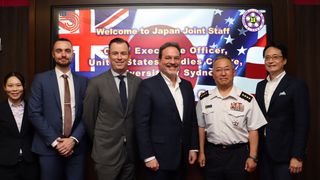From 12-14 June, a United States Studies Centre (USSC) delegation travelled to Tokyo for a series of meetings, roundtables, and conferences with leaders from government, corporations and think tanks.
The USSC delegation had four members, including CEO and Professor Dr Michael Green, Director of Foreign Policy and Defence Program Professor Peter Dean, Research Fellow Tom Corben, and Research Associate Shizuka Takada.
The delegation introduced USSC initiatives on Indo-Pacific security and sought to understand the direction of Japan’s national security strategies and the opportunities for deepening cooperation with the United States and Australia.
Tokyo
Monday, 12 June
The delegation met with Deputy Minister of Foreign Policy Ichikawa Keiichi (the head of the foreign policy bureau and the drafter of Japan’s Free and Open Indo-Pacific vision). The discussion covered a wide range of topics and regions, including Japan’s New National Security Strategy (NSS), Australia’s Defence Strategic Review (DSR), G7, Quad, and NATO.
The team then visited the Ministry of Defense (MOD) to meet with Vice Minister Atsuo Suzuki, Chief of Staff of Japan Self-Defense Forces Gen Yoshihide Yoshida, and Vice-Minister of Defense for International Affairs Masami Oka. The delegation and the MOD leadership reaffirmed the importance of the US-Australia-Japan trilateral security cooperation agenda in the current Indo-Pacific context and exchanged views on different initiatives that might enhance that cooperation.
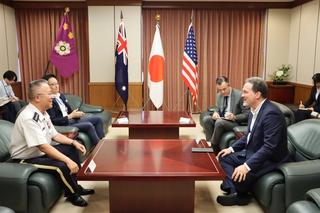
The senior team then met with the US Ambassador to Japan, Rahm Emanuel and Deputy Chief of Mission Raymond Greene.
The first day concluded with a casual dinner roundtable with leading experts on Japan’s politics, defence policy and international relations.
Tuesday, 13 June
The day started with a roundtable meeting with prominent Diet members who had well-informed questions about Australia’s role and Indo-Pacific security and the opportunities for bilateral and trilateral defence cooperation.
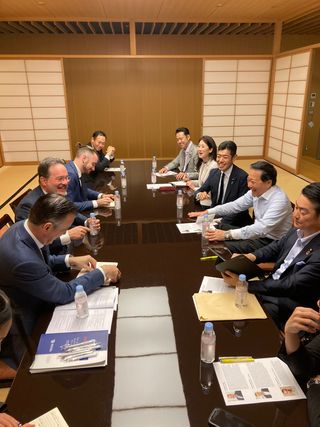
The delegation then visited the Headquarters of US Forces Japan at Yokota Airbase in for a roundtable with Deputy Commander BGen George Rowell and senior staff.
The team then returned to Tokyo to meet Senior Deputy for Foreign Affairs Shigeo Yamada.
Wednesday, 14 June
The team met Chief of Staff of Japan Air Self-Defense Forces, Gen Hiroaki Uchikura, for an exchange of views on how Australia and Japan can reinforce each other’s defence modernisation efforts.
The delegation then visited Foreign Minister Yoshimasa Hayashi, who stressed the importance of greater cooperation between Australia and Japan for the peace and stability of the region and shared his views on implementation of Japan’s NSS.
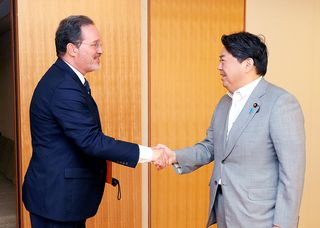
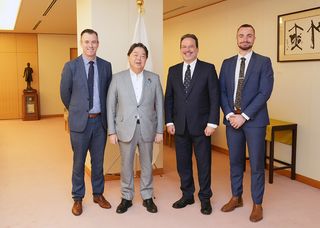
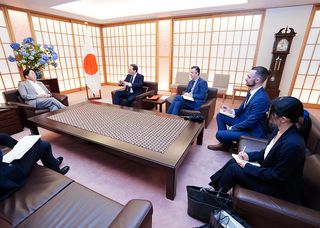
The delegation was then hosted by the Australian Ambassador to Japan, Justin Hayhurst.
In the afternoon, the delegation met Representative Itsunori Onodera, Chair of the LDP Security Commission.
Later that afternoon, the Japan Institute for International Affairs (JIIA) hosted a roundtable with the delegation and a range of government stakeholders, prominent security experts, and representatives from the Australian and US embassies.
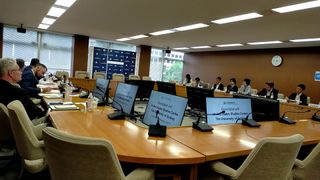
Across all the meetings, some common themes emerged from the discussion:
- Australia’s Defence Strategic Review (DSR) and Japan’s National Security Strategy are well aligned in their assessments of the security environment and major areas of focus for strategy, policy, and capability-building. Australia and Japan generally perceive the balance of power in the Indo-Pacific in similar terms, and are aligned in their view of the individual and collective responses required to shore-up a favourable regional order. These requirements are reflected in the ambitious defence build-ups flagged in Japan’s 2022 National Defense Strategy and Australia’s 2023 Defence Strategic Review. Indeed, in its National Defense Strategy the Japanese Government officially designates Australia as its most important strategic partner in the Indo-Pacific after the United States. Informally, many in Japan now refer to the US-Japan-Australia trilateral relationship as the “core” of their country’s regional security strategy.
- Australia and Japan are beginning to identify specific initiatives to implement the ambitious agenda laid out in the October 2022 Joint Declaration on Security Cooperation and the December 2022 Defence and Foreign Ministers’ Joint Statement. For Japan, accelerating the development of new and more complex joint exercises appears to be a top priority; namely, through leveraging expanded US-Australia exercises in Northern Australia, and by conducting more ‘asset protection’ missions leveraging the Japan Self-Defense Force’s newly-acquired legal permissions to defend Australian ships and aircraft. However, it is less clear whether there are specific US-Japan force posture initiatives where Australian forces could or should ‘plug-in’. While, recent trilateral exercises in Japan featuring intelligence, surveillance and reconnaissance (ISR) and maritime domain awareness (MDA) assets from all three countries provide some indication of the possibilities here, these efforts have yet to be formalised in the same manner as intentions to integrate Japanese forces into US-Australia arrangements yet to be formalised in the same manner that the “integration” of Japanese forces into equivalent mechanisms in Australia has been spoken of.
- Japanese policymakers see growing opportunities for cooperation on defence industry and technology matters. This includes key capability categories under AUKUS Pillar Two (particularly on hypersonics and unmanned systems), through Australia’s Guided Weapons and Explosive Ordnance Enterprise, and untethered projects such as on integrated air and missile defence. There is ambition to transition the bilateral relationship’s current focus on co-development to a more complete range of research, development, testing and evaluation (RDT&E), as well as co-production where appropriate. This includes the use of Australian testing and training ranges. However, these same policymakers also recognise that Japan must tighten information security regulations and standards to facilitate safe and secure collaboration on such projects.
- Compared to the US-Japan relationship, the Japan-Australia relationship requires much greater investment in ‘human interoperability’. This will require government-to-government and military-to-military cooperation, as well as think tank collaboration, more frequent parliamentary exchanges and a greater number of cross-border secondments between government and non-government organisations. These sorts of exchanges will be essential if the two countries are to develop the deeper mutual understanding of one another’s cultural, political and strategic contexts required to cement the new advances being made in the official relationship. For Australia, developing deeper analytical understanding of ‘strategic Japan’ should be a priority.





